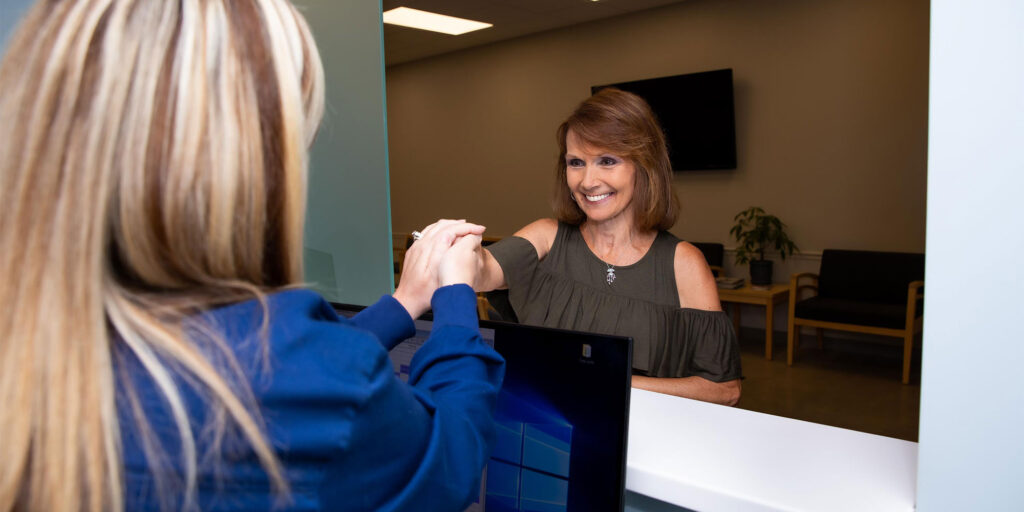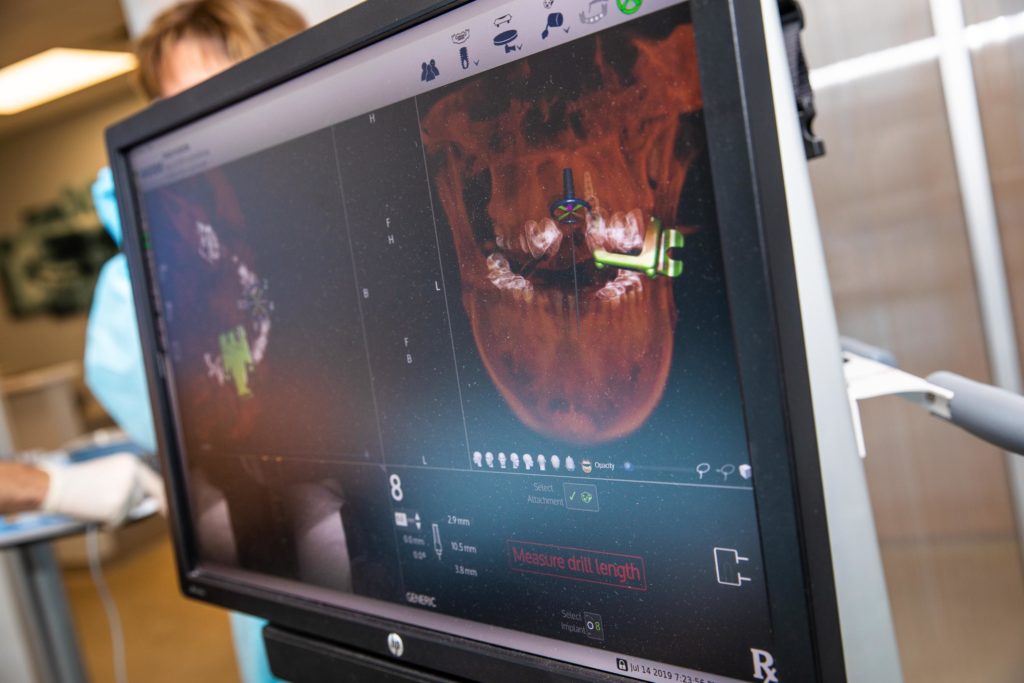
If you experience recurring jaw pain, have trouble eating, or your bite does not come together properly, the reason may be due to an improper jaw position. Jaw disfunction is more than just a functional concern, many patients even experience an imbalanced facial appearance which gradually wears away at the jawbone and muscle. Our oral surgeons at Western Pennsylvania Oral & Maxillofacial Surgery offer patients experiencing jaw concerns effective and precise jaw surgery. Jaw surgery, or orthognathic surgery, usually involves repairing issues in the jawbones themselves along with the realignment of the teeth for a proper fit. As jaw surgery is a more invasive procedure, we will typically try to realign your jaw through other methods, like ClearCorrect orthodontics or bone grafting first, but if these prove to be ineffective, we won’t have you living with discomfort any longer.
With our oral and maxillofacial surgeons having a hospital-based education along with additional years of schooling to better understand the jaw, teeth and bones, we are your leading source for effective jaw surgery. We see patients for corrective jaw surgery as a result of facial trauma, natural birth defects or improper bone growth. With over 13 years offering advanced care to patients in the Washington, PA and surrounding areas, we strive to restore your quality of life and aesthetics with corrective jaw surgery.

When performing jaw surgery, we often work closely with your general dentist to create a treatment plan that is unique to you. We never perform a one-size-fits-all surgery or compromise on results, thus we work to make sure your jaw is corrected to the ideal functional and aesthetic results. Thanks to our cone beam CT imaging, we are able to capture detailed images of your jaw, bones, nerves and location of tooth roots. This allows us to better plan your treatment and ensures nothing is missed. On the day of surgery, we offer a variety of anesthesia options including IV sedation to suit your needs so you won’t need to feel anxious or worry about discomfort. And once fully healed, your jaw will be able to function properly without stress or pain.
Jaw surgery, also known as orthognathic surgery, is a procedure performed to correct a variety of minor and major skeletal and dental irregularities, including the misalignment of jaws and teeth. This surgery can improve chewing, speaking, and breathing, and can also enhance the overall appearance of the facial profile. Individuals might need jaw surgery for several reasons, such as congenital disabilities, trauma-related injuries, or developmental issues that have resulted in a misaligned jaw. In some cases, orthodontics alone cannot correct these issues, and surgical intervention becomes necessary to achieve optimal function and aesthetics. Dr. Steven Krakora at Western Pennsylvania Oral Maxillofacial Surgery in Washington, PA, is highly skilled in performing such surgeries, ensuring patients achieve the desired functional and aesthetic outcomes.
The jaw surgery process typically involves several stages, beginning with a comprehensive evaluation by an oral and maxillofacial surgeon. Dr. Steven Krakora will conduct a thorough examination, which may include X-rays, photographs, and 3D models of your teeth and jaw. This evaluation helps in planning the surgery accurately. Once the surgical plan is finalized, the procedure is performed under general anesthesia, ensuring the patient is comfortable and pain-free. Depending on the complexity, the surgery can take several hours. Post-surgery, patients may need to stay in the hospital for a day or two for monitoring. Recovery involves managing swelling and discomfort, which are common in the initial weeks. Patients are advised to follow a specific diet and oral care routine to aid healing. Regular follow-up visits with Dr. Krakora ensure that the recovery is progressing as expected and any concerns are promptly addressed.
Recovery from jaw surgery is a gradual process that can take several weeks to months, depending on the individual and the complexity of the surgery. Initially, patients may experience swelling, bruising, and discomfort, which typically subside within a few weeks. Dr. Steven Krakora will provide detailed post-operative care instructions, including dietary guidelines. Patients are usually advised to stick to a soft or liquid diet for a few weeks to prevent strain on the healing jaw. Maintaining oral hygiene is crucial, and specific cleaning techniques will be recommended to ensure the surgical site remains free from infection. Regular follow-up appointments with Dr. Krakora are essential to monitor healing and address any concerns. Engaging in strenuous activities should be avoided until cleared by the surgeon. Most patients can return to their normal routine within a few weeks, although complete healing and adjustment can take several months.
Like any surgical procedure, jaw surgery carries some risks, but these are generally rare and manageable with proper care and expertise. Potential risks include infection, bleeding, nerve injury, and issues with jaw alignment post-surgery. However, choosing a highly qualified and experienced surgeon like Dr. Steven Krakora significantly minimizes these risks. Prior to surgery, Dr. Krakora will discuss all potential risks and benefits with you, ensuring you have a clear understanding of the procedure. Post-operative care is crucial in managing any complications that may arise. Patients are encouraged to follow all care instructions meticulously and report any unusual symptoms immediately. With the right precautions and expert care, the benefits of jaw surgery often far outweigh the risks, leading to enhanced functionality and aesthetics for the patient.
Request your consultation
I understand the information disclosed in this form may be subject to re-disclosure and may no longer be protected by HIPAA privacy regulations and the HITECH Act.
Schedule your consultation and experience it for yourself.
I understand the information disclosed in this form may be subject to re-disclosure and may no longer be protected by HIPAA privacy regulations and the HITECH Act.
We have always exceeded the strict OSHA-mandated protocols to maintain a highly sterile environment within our offices. These guidelines were created to safeguard against the spread of severely contagious diseases such as tuberculosis and measles, and they are equally effective in managing the spread of influenza and coronavirus.
In addition we have added more rigorous disinfecting techniques and sterilize common areas more often. Our office has added a sanitizing system directly to our HVAC which “cleans” the air continuously for an added safety measure. We have minimized contact with staff as much as possible by utilizing the internet and phone contact when possible, and have added the option for some to do a virtual visit.
Book Now
You have successfully subscribed to the newsletter
There was an error while trying to send your request. Please try again.
